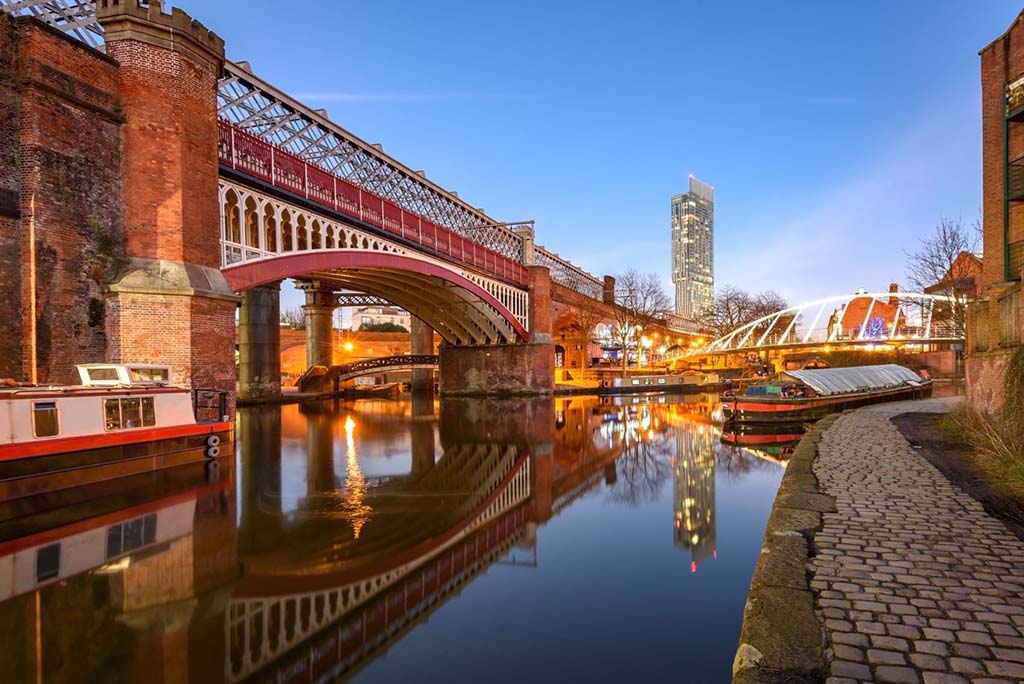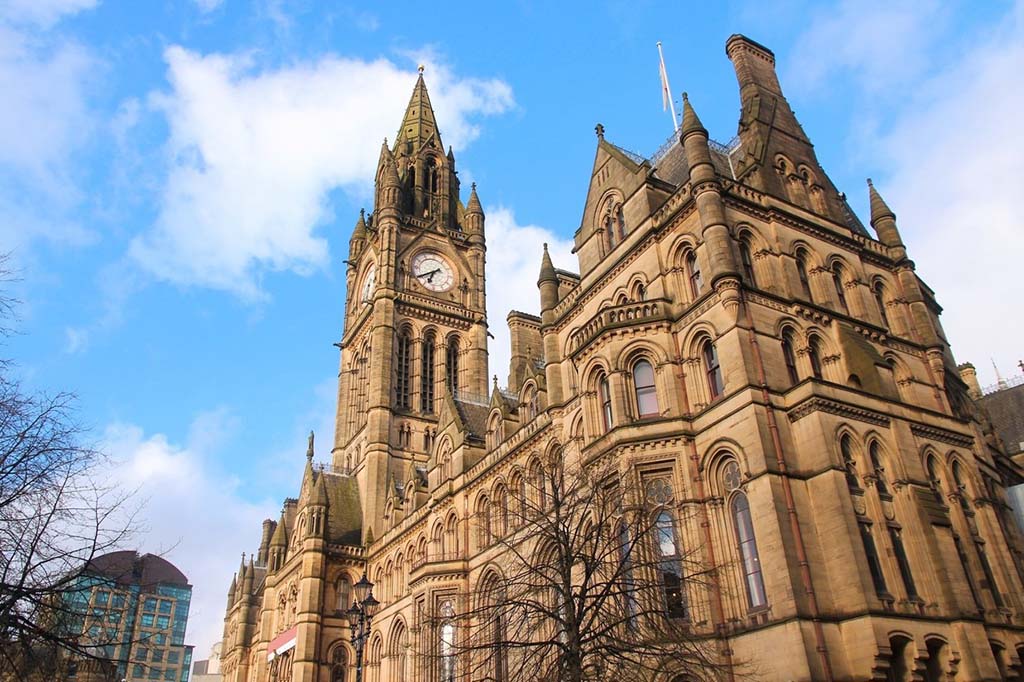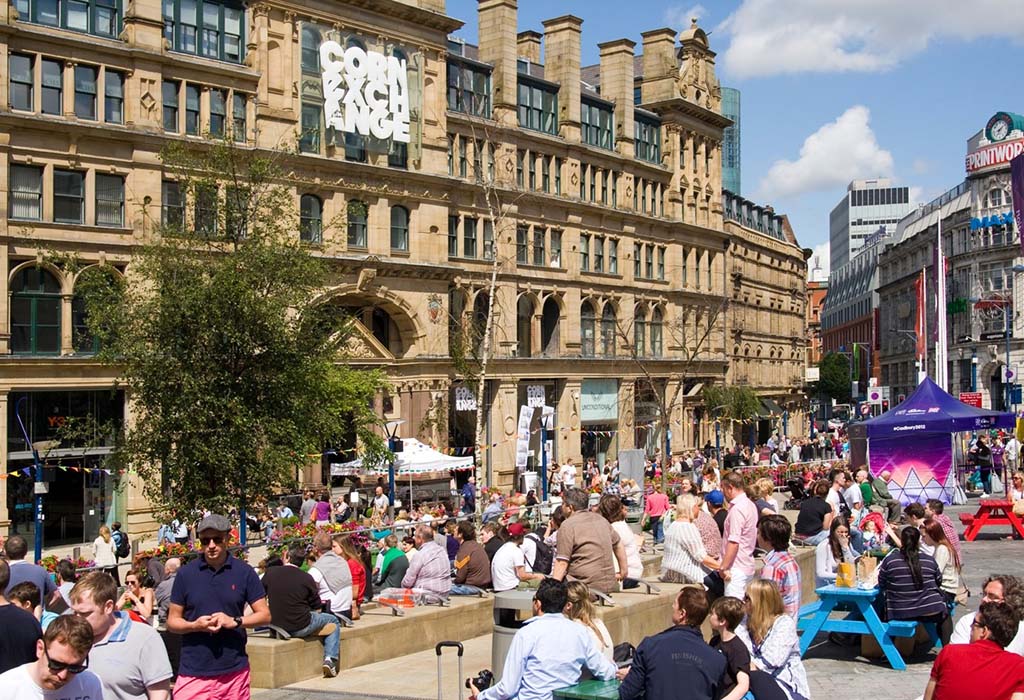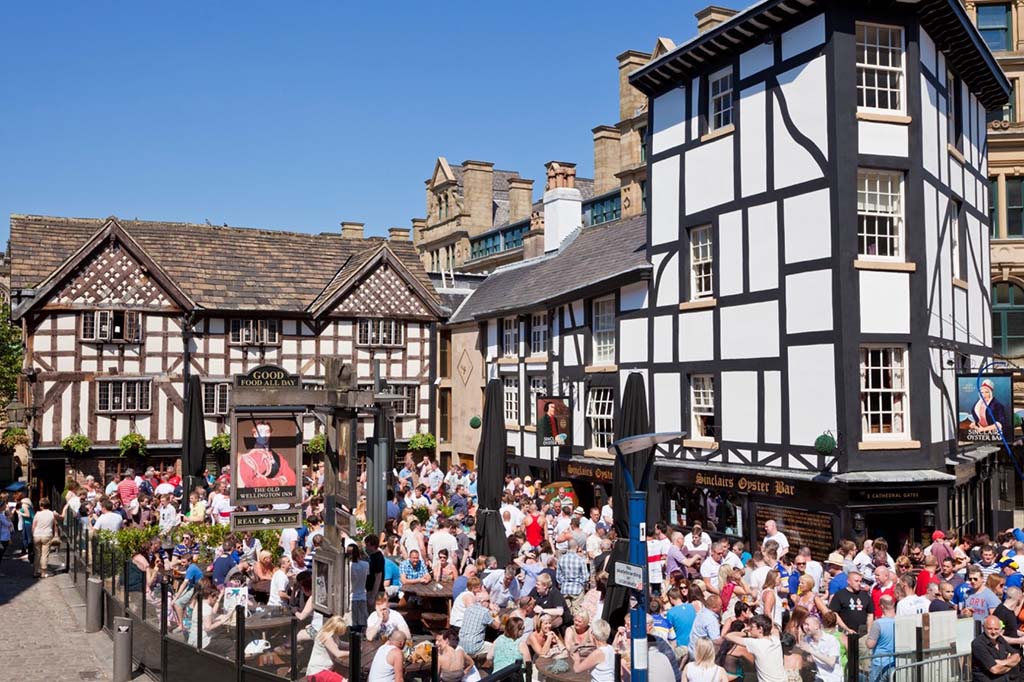Language study trip England: Manchester

Manchester, once a dirty industrial city, is now a major multicultural metropolis of millions in England, connected to the sea via the Bridgewater Canal. The city, once known as "Cottonopolis", which became immensely wealthy with its cotton mills, was attacked by an IRA bomb in the mid-1990s and large parts of the city center were destroyed. The reconstruction drastically changed the cityscape - where Victorian buildings once adorned the city center, many glass and chrome buildings now tower into the sky.
Manchester is not a sleepy nest, but a vibrant, modern city in the north of England, with a diverse cultural offering, culinary delights, an exhilarating party scene and great live music. If you come to Manchester, there are plenty of opportunities to party and even more to relax. Because in the more than 100 parks and open gardens, you can forget the hustle and bustle of the city for a brief moment during a language study trip in Manchester and find peace and quiet before setting off again on a voyage of discovery to one of the many fascinating museums, sights and events.

Which language school to choose for a language study trip to Manchester?
The majority of Manchester's language schools are located directly in the city center and are therefore ideally situated for exploring the city or relaxing in a café or pub during your lunch break or after your English lessons. The parks are also not far away, as are many museums and shopping facilities, making the central location of many language schools ideal. There are also some language schools located a little further away from the city center, which also offer high-quality lessons, but are sometimes around 45 minutes away by bus or 20 minutes by car. If this is too far away, you should also consider the location when choosing a language school.
However, the location of the language school in Manchester is of course not the only decisive factor in the selection process. Other criteria should also be taken into account, such as the size of the classes, the choice of language courses, the accommodation on offer, the school's infrastructure and the mix of nationalities. In the guide "Language courses in England" you will find a very good overview of the most important steps in planning your language study trip and choosing a suitable language school.
You may also benefit from the opinions and ratings of former students who have already attended one or more language schools in Manchester and are happy to share their experiences with you. You can find such testimonials here on Ausbildung-Weiterbildung.ch, as well as on social networks and via the Google Maps search of the individual language schools. In this way, you can find out how well the respective schools are rated by language students and, above all, for what reasons. This information can serve as a guide and make it easier for you to narrow down your choices. Some language travel providers also have reviews from former language students on their websites or will be happy to send them to you on request.

Where to live in Manchester?
In the vast majority of cases, language schools offer various types of accommodation during a language study trip for their students in Manchester. Accommodation with a host family is one of the most popular, as it is cheaper than most others and also promotes the use of the English language the most. If you are staying with a host family, it is therefore best to book half board and eat breakfast and dinner with the family. This will not only improve your relationship with the family, but also your own English, which you will need to use on a daily basis outside of your English course. Even if you are reluctant to live with a host family because your English is still very weak, you should by no means ignore this option. In a host family, you will quickly learn how to hold everyday conversations and will notice how more in-depth conversations become more and more natural over the course of your stay.
If you already speak English well or don't feel like socializing with a family despite all the advantages, language schools usually offer other options for accommodation during a language study trip. One of these is the dormitory, where language students from all over the world live in single or double rooms, often with their own small bathroom, and share a kitchen and possibly a common room. Shared flats are also an option, although they usually do not have their own bathroom. Alternatively, there are also apartments where both a bathroom and a small kitchenette are integrated into the room, but there are often no communal areas available. This type of accommodation is therefore more isolating than sociable and does not really promote the use of English.
In most cases, the apartments or houses of the host families are around 30 to 40 minutes' walk or bus ride from the language school. Residences, halls of residence, shared flats and apartments may also be closer to the schools and the city center. It is best to find out directly from the language travel providers what the maximum distance by public transport from the school to the accommodation and the city center is and, if necessary, ask for the exact address (not possible with host families). In this way, you can find out online where the accommodation is located and what transport connections are available.

What to experience in Manchester!
You certainly won't be bored during your language study trip to Manchester. There are shopping opportunities, museums, restaurants, entertainment and sights on every corner of the city, offering you a varied day and night program. The Town Hall, Central Library and Midland Bank are particularly architecturally beautiful and should not be missed on your voyage of discovery through the city. Also not to be missed in Manchester are the Art Gallery, the best art museum in the city, the People's History Museum, where you can learn more about the history of England, and the Museum of Science & Industry, which tells the story of Manchester's (post-)industrial revolution. The National Football Museum might also be of interest to some, as might the John Rylands Library or the Imperial War Museum North.
If museums are not necessarily an enjoyable leisure activity for you, you might prefer a guided tour of Old Trafford, Manchester United's football stadium. Or you could watch a cricket match at Lancashire Country Cricket Club and enjoy the gentlemen's game of one of England's most popular county teams.
If sport is not your thing, you might enjoy one of the many festivals and events in Manchester, such as the Manchester Food & Drink Festival in mid-October, the biennial Manchester International Festival or Manchester Day, with a parade and lots of spectacle. The open-air cinema in Spinningfields is also highly recommended, which is open throughout the summer and broadcasts classic films as well as sporting highlights, such as the Tour de France. The Isle of Man is also worth a visit, where you can go on a wonderful hike, as well as a boat trip across the Peak Forest Canal.
During your language study trip to Manchester, the Manchester Evening News will keep you informed about nightlife in the city, from comedy and theater to concerts and club nights. If you don't want to miss anything, be sure to check out the "what's on" section. We also recommend the Restaurants of Manchester and Manchester Bars pages, where you can find information, tips and reviews on many of the city's restaurants and bars, including those offering afternoon tea. You can also find out more about Manchester on the tourist information website.

How to get around Manchester?
Manchester has a very good public transport network. The Centreline bus 4 runs through Manchester city center every ten minutes and is free for all passengers. If you want or need to travel a little further, take the Metrolink, which also goes to the suburbs. Tickets can be purchased on the platform. On Transport for Greater Manchester you can find all the information about the various timetables, Day Saver tickets and night buses.

What can you afford in Manchester?
Of course, living in Manchester can be expensive, especially if you visit top restaurants such as The French Manchester in The Midland Hotel every day, or if you don't want to miss a concert at the MEN Arena, the Ruby Lounge or Bridgewater Hall. In all other cases, a language study trip to Manchester doesn't necessarily have to be expensive. For example, you pay just over £4 for the train from the airport and only £3.50 for the bus, you can take part in guided tours for around £7, the Manchester Art Gallery is free, as is entry to the People's History Museum, the Imperial War Museum North and the Museum of Science & Industry.
You can eat cheaply in Manchester in many places, for example in Rosylee Tearooms, where you can get lunch from around £7; in Jamie's Italy, a branch of Jamie Oliver in the art deco building Midland Bank, the main course costs between £11 and £20. It is therefore quite possible to enjoy the cultural and gastronomic life in Manchester even on a tight budget.
